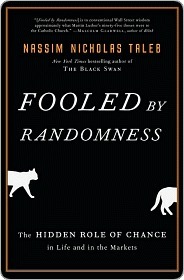More on this book
Community
Kindle Notes & Highlights
Much of what rational thinking seems to do is rationalize one’s actions by fitting some logic to them.
A more vicious effect of such hindsight bias is that those who are very good at predicting the past will think of themselves as good at predicting the future, and feel confident about their ability to do so. This is why events like those of September 11, 2001, never teach us that we live in a world where important events are not predictable—even the Twin Towers’ collapse appears to have been predictable then.
(It takes a huge investment in introspection to learn that the thirty or more hours spent “studying” the news last month neither had any predictive ability during your activities of that month nor did it impact your current knowledge of the world. This problem is similar to the weaknesses in our ability to correct for past errors: Like a health club membership taken out to satisfy a New Year’s resolution, people often think that it will surely be the next batch of news that will really make a difference to their understanding of things.)
this explains why people who look too closely at randomness burn out, their emotions drained by the series of pangs they experience. Regardless of what people claim, a negative pang is not offset by a positive one (some psychologists estimate the negative effect for an average loss to be up to 2.5 the magnitude of a positive one); it will lead to an emotional deficit.
I blame people for not learning enough from history. The problem is that we read too much into shallow recent history, with statements like “this has never happened before,” but not from history in general (things that never happened before in one area tend eventually to happen). In other words, history teaches us that things that never happened before do happen. It can teach us a lot outside of the narrowly defined time series; the broader the look, the better the lesson. In other words, history teaches us to avoid the brand of naive empiricism that consists of learning from casual historical
...more
In the markets, there is a category of traders who have inverse rare events, for whom volatility is often a bearer of good news. These traders lose money frequently, but in small amounts, and make money rarely, but in large amounts. I call them crisis hunters. I am happy to be one of them.
I suddenly felt financially insecure and feared becoming an employee of some firm that would turn me into a corporate slave with “work ethics” (whenever I hear work ethics I interpret inefficient mediocrity).


